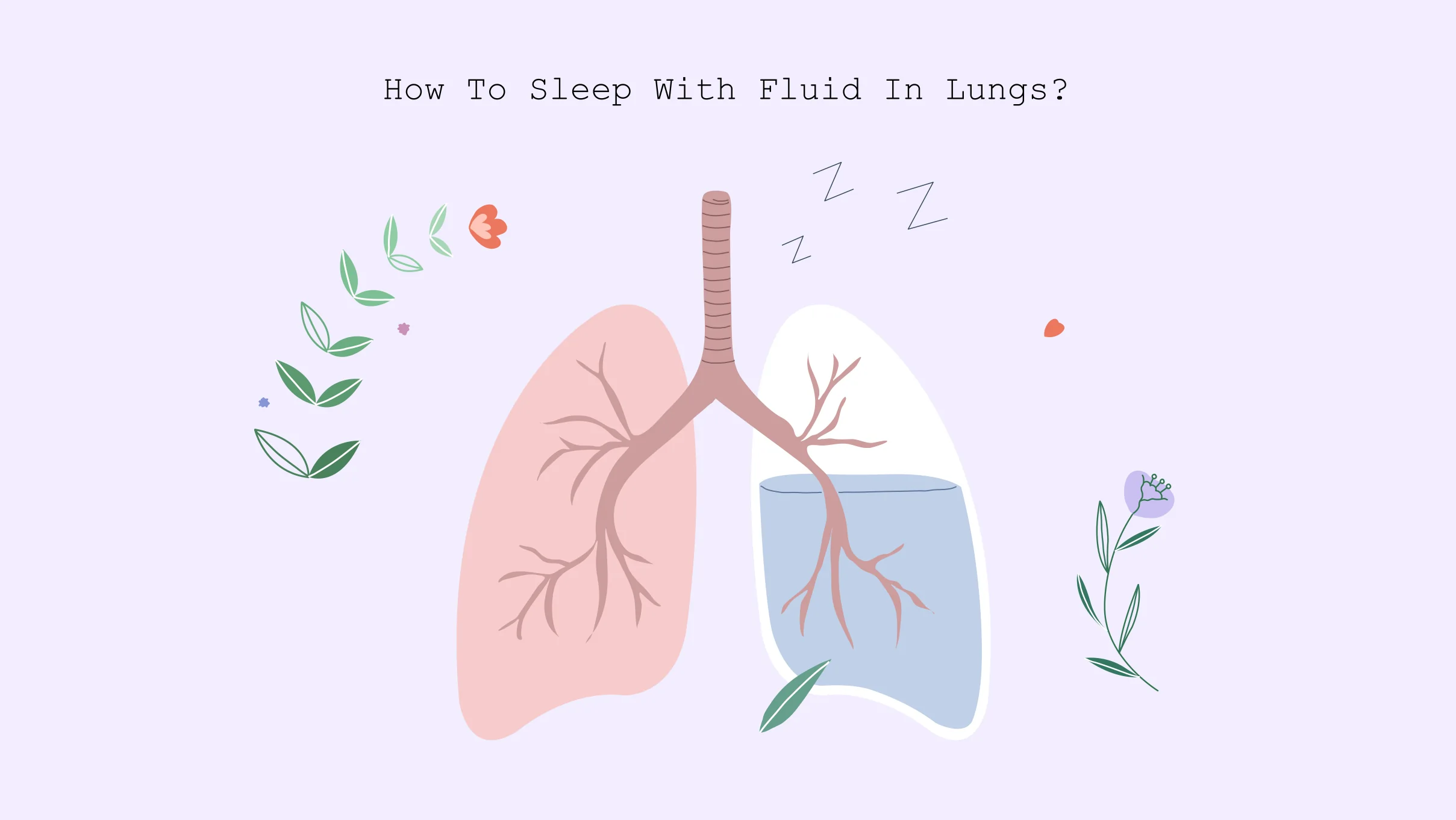How To Sleep With Fluids In Your Lungs
Written by


The association between sleep and good health is no longer a secret. We all know how a good night’s rest aids our overall well-being. But sometimes life has other plans where acute or chronic conditions make it challenging to get the zzzs you need. From a common cold to heart failure, several conditions put immense pressure on the lungs, which can cause fluid buildup. If that’s the case, immediate treatment is essential as it can be life-threatening.
The symptom of fluid buildup in the lungs is pulmonary edema. Now, this is not a condition or a disease on its own but a sign that can occur due to various conditions. Usually, untreated pneumonia can be the main culprit. However, as you receive the treatment, proper healing can happen when you sleep well. Today, Sleep Guides India will tell you how to sleep with fluids in lungs.
What Causes Fluid in Lungs (Pulmonary Edema)?
There can be various reasons for pulmonary edema or fluid in your lungs. But this symptom can be categorized into two parts to understand its causes.
- One of the reasons for pulmonary edema is a heart problem.
- In the second case, the pulmonary edema can be due to other conditions, such as pneumonia. It is known as non-cardiogenic pulmonary edema.
In some cases, patients may also suffer from both cardiogenic and non-cardiogenic pulmonary edema.
Heart-related Fluid in the Lungs
The fluid buildup in the lungs due to a heart problem occurs when there is excess pressure in the heart. It can be due to heart failure. Some of the conditions that cause heart problems and lead to fluid buildup in the lungs are;
Cardiomyopathy
Cardiomyopathy is a condition where the heart muscles become damaged. Hence, they must exert more pressure and pump harder, causing the pressure to elevate. Now, there can be instances when the heart isn’t able to pump harder, such as during a strenuous exercise, leading to fluid buildup in the lungs.
High Blood Pressure
When you have untreated or extremely high blood pressure, it can enlarge the heart, causing fluid buildup in the lungs.
Coronary Artery Disease
With time, there are chances that the arteries responsible for transporting blood become narrow. Sometimes, a blood clot can also be the reason for narrowing. It is known as coronary artery disease. This damages the heart muscle and can even lead to a heart attack. The damaged heart may not be able to pump blood as it should, and it can cause fluid buildup in the lungs.
Kidney Disease
If you are suffering from high blood pressure due to narrow kidney arteries or fluid buildup due to kidney disease it can be the reason for fluid buildup in the lungs.
Non-Heart-related Fluid in Lungs
Non-heart-related fluid in the lungs is not because of the excess pressure on the heart. Some of the most common causes are;
Acute Respiratory Distress Syndrome (ARDS)
ARDS is a severe condition with sudden fluid buildup in the lungs. Several conditions, such as severe injury, pneumonia, or severe bleeding can cause it.
Pulmonary Embolism
It is a condition when a blood clot stops the blow flow of the artery to the lung. The symptoms of the condition vary depending on the size of the clot, but you may experience shortness of breath, chest pain, and fainting.
Allergic Reaction to a Medicine
Sometimes you may experience an allergenic or adverse reaction from a drug, such as aspirin, to illegal ones, such as cocaine, which leads to fluid buildup in the lungs.
Sleep apnea
Heart problems caused by sleep apnea can lead to pulmonary edema. Sleep apnea is a condition where there is a temporary blockage in the airways.
High-Altitude-Cause Pulmonary Edema
This condition occurs to some people residing in high altitudes, hikers or mountain climbers above 8,000 feet. It is also known as high-altitude pulmonary edema.
Fire Hazard
Sometimes when there is a fire hazard, when people inhale, some unsafe substances and the fire smoke. And when too much of it is inhaled, it can lead to fluid buildup in the lungs.
Negative Pressure Pulmonary Edema
If you have experienced severe congestion in your upper respiratory tract, it can lead to negative pressure on the lungs, especially if you hyperventilate. This is a treatable condition.
How to Sleep With Fluid in Lungs (Pulmonary Edema)?
Now, let’s understand how you can sleep with fluid in your lungs to be comfortable.
Sleep on Your Side

Several people with pulmonary edema who sleep on their back or supine position report that the symptoms aggravate and the fluid buildup in the lungs tends to travel backward. It can also cause shortness of breath when lying down. This is why sleeping on your side can be highly beneficial. Try this best position for pulmonary edema. It is also about how to sleep with pleurisy and also the best positions for COPD patients.
To make sure it feels all the more comfortable to sleep in this best sleeping position to clear your lungs, you can always use a pillow to support the knees. It is also a pleural effusion sleep position.
Back Position With Extra Pillows

If the reason for your pulmonary edema is due to heart failure, sleeping on the back can be the best sleeping position for pulmonary edema here. However, don’t lay flat on your back. Make sure you use a stack of pillows to elevate you for the best way to sleep to clear lungs.
Use a Recliner

If you were in the hospital using an adjustable bed for the right pulmonary edema position, your doctor may recommend you use a recliner if you have one. This is because it is essential to keep your neck and head elevated. You can always buy a lumbar pillow if you don’t have a recliner.
Use CPAP Machine
A CPAP machine can be an effective treatment method for some cases of pulmonary edema. However, it should be prescribed by your doctor. It works because it transports oxygenated air to the lungs. For more information, you can speak with the doctor.
Avoid Salt-Rich Food
If you are suffering from fluid in lungs due to a heart problem, your doctor may recommend lifestyle changes, one of which is not to eat salt-rich food. Also, you must maintain a healthy lifestyle and try the best sleeping position for breathing problems.
Weight Loss
If you are obese or overweight, weight loss should be something you must work on. According to studies, hydration can help with weight loss as sodium bonds can be broken and lead to a natural diuretic reaction.
Sitting position for Better Breathing
When it comes to sitting with water in lungs, try this;
- Place your feet on the floor and make sure you lean your chest forward very slightly
- Now, rest your elbows on the knees and chin on the hands
- Finally, relax your shoulder and neck muscles
If you want to lie down sitting, make sure there is a table in front of you and keep pillows on the table to elevate your head and take a nap.
Standing position for Better Breathing
When you are standing with wet lungs, try the below tips;
- Stand with your feet apart and lean against a wall
- Now, rest your hands on your thighs
- Finally, relax the shoulders and lean forward with your arms in front of you
Conclusion
Try the above tips on how to sleep with fluids in the lungs. While it may feel difficult in the beginning, with practice you will be able to enjoy a good night’s rest. For more, don’t hesitate to speak with your doctor.
FAQs
Can lying down cause fluid in the lungs?
As aforementioned, laying on the back can cause fluid to move backwards and make sleep difficult for you.
How long can you survive with pulmonary edema?
If pulmonary edema is due to heart failure, there are chances that people live longer than five years with the right treatment. However, it can differ from one individual to another. Hence, speak with your doctor for more.
How long does it take to drain fluid from the lungs?
The procedure is known as thoracentesis and it takes about 15 minutes.
How do you get fluid out of your lungs without surgery?
Some ways to clear fluids out of the lungs without surgery include diuretics and medication.
Is removing fluid from the lungs painful?
No, but your chest may feel sore after the procedure.
people like this article
Written by








